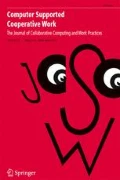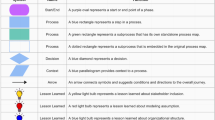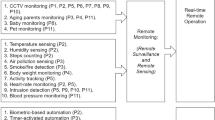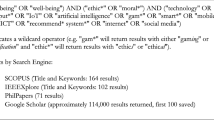Abstract
Achieving the sustainability of IT-based solutions is a challenge. We will argue in this paper that it is helpful to conceptualize designing for sustainable IT-based solutions as taking place in a multi-dimensional space. It requires thinking about how a project is framed; the perspectives and commitments of the project partners; the type of innovation that is foregrounded; the motivations and needs of the user group; and the level of sustainability a project or research program may achieve. The paper describes some of the challenges and possible solutions by revisiting a portfolio of projects that developed IT support for elderly people who continue living in their own homes.


Similar content being viewed by others
Notes
In the terminology adopted in this paper the right term here would be transferability: this shows how the discourse about sustainability is far from a consolidated systematization.
References
Aanestad, Margunn; and Ole Hanseth (2003). Design as bootstrapping: on the evolution of ICT networks in health care. Methods of Information in Medicine, vol. 42, pp. 385–391.
Aanestad, Margunn; Miria Grisot; Ole Hanseth; and Polyxeni Vassilakopoulou (2017). Information infrastructures and the challenge of the installed base. In M. Aanestad; M. Grisot; O. Hanseth; and P. Vassilakopoulou (eds): Information Infrastructures within European Health Care: Working with the Installed Base. Springer International Publishing, pp. 25–33.
Aarhus, Rikke; and Stinne Aaløkke Ballegaard (2010). Negotiating boundaries: managing disease at home. CHI’10. Proceedings of the SIGCHI conference on Human Factors in Computing Systems, Atlanta, Georgia, USA, 10–15 April 2010. New York: ACM Press, pp. 1223–1232.
Altman, David G. (1995). Sustaining interventions in community systems: on the relationship between researchers and communities. Health Psychology, vol.14, no. 6, pp. 526–536.
Anderson, Neil; Karsten C. De Dreu; and Bernard A. Nijstad (2004). The routinization of innovation research: A constructively critical review of the state-of-the-science. Journal of Organizational Behavior, vol. 25, no. 2, pp. 147–173.
Avgerou, Chrisanthi (2008). Information systems in developing countries: a critical research review. Journal of information Technology, vol. 23, no. 3, pp. 133–146.
Balka, Ellen; and Ina Wagner (2006). Making things work: dimensions of configurability as appropriation work. CSCW’06. The 20th anniversary ACM conference on Computer supported cooperative work. Banff, Alberta, Canada, 4–8 November 2006. New York: ACM Press, pp. 229–238.
Ballegaard, Stinne Aaløkke; Jonathan Bunde-Pedersen; and Jakob E. Bardram (2006). Where to, Roberta? Reflecting on the role of technology in assisted living roles. NordiCHI 2006. Proceedings of the 4th Nordic conference on Human-computer interaction, Oslo, Norway, 14–18 October 2006. New York: ACM Press, pp. 373–376.
Baskerville, Richard; and Michael D. Myers (2004). Special Issue on Action Research in Information Systems: Making IS research relevant to practice: foreword. MIS Quarterly, vol. 28, no. 3, pp. 329–335.
Betz, Matthias; and Volker Wulf (2018). Towards transferability in grounded design: comparing two design case studies in firefighting. In V. Wulf; V. Pipek; D. Randall; M. Rohde; K. Schmidt; and G. Stevens (eds): Socio Informatics – A Practice-based Perspective on the Design and Use of IT Artefacts. Oxford: Oxford University Press, pp. 459–488.
Bietz, Matthew J.; Eric PS Baumer; and Charlotte P. Lee (2010) Synergizing in cyberinfrastructure development. Computer Supported Cooperative Work (CSCW), vol. 19, no. 3–4, pp. 245–281.
Bjerknes, Gro and Bratteteig, Tone (1988). Computers—utensils or epaulets? The application perspective revisited. AI & Society, vol. 2, no. 3, pp. 258–266.
Bødker, Susanne (1994). Creating conditions for participation: conflicts and resources in systems design. DAIMI Report Series 13, no. 479.
Bødker, Susanne and Pär-Ola Zander (2015). Participation in design between public sector and local communities. C&T '15. The 7th International Conference on Communities and Technologies, Limerick, Ireland, 27–30 June 2015. New York: ACM Press, pp. 49–58.
Bossen, Claus; and Peter Dalsgaard (2005). Conceptualization and appropriation: the evolving use of a collaborative knowledge management system. Proceedings of the 4th decennial conference on Critical computing: between sense and sensibility, Aarhus, Denmark, 21–25 August 2005. New York: ACM Press, pp. 99–108.
Boudiny, Kim (2013). Active ageing: from empty rhetoric to effective policy tool. Ageing and society, vol. 33, no. 6, pp. 1077–1098.
Bowers, John; Graham Button; and Wes Sharrock (1995). Workflow from within and without: technology and cooperative work on the print industry shopfloor. In H. Marmolin; Y. Sundblad; and K. Schmidt (eds): ECSCW’95. Proceedings of the Fourth European Conference on Computer-Supported Cooperative Work, Stockholm, Sweden, 10–14 September 1995. Dordrecht: Springer, pp. 51–66.
Braa, Jørn; Eric Monteiro; and Sundeep Sahay (2004). Networks of action: sustainable health information systems across developing countries. MIS Quarterly vol. 28, no. 3, Special Issue on Action Research in Information Systems (Sep. 2004), pp. 337–362.
Bratteteig, Tone; and Ina Wagner (2014). Disentangling participation: Power and decision-making in participatory design. Cham: Springer International Publishing.
Bratteteig, Tone; and Ina Wagner (2016). Unpacking the notion of participation in Participatory Design. Computer Supported Cooperative Work (CSCW), vol. 25, no. 6, pp. 425–475.
Brundtland, Gro H. (1987). Our Common Future: The World Commission on Environment and Development. Oxford: Oxford University Press.
Brynjarsdottir, Hronn; Maria Håkansson; James Pierce; Eric Baumer; Carl DiSalvo; and Phoebe Sengers (2012). Sustainably unpersuaded: how persuasion narrows our vision of sustainability. CHI’12. Proceedings of the SIGCHI Conference on Human Factors in Computing Systems, Austin, Texas, USA, 5–10 May 2012. New York: ACM Press, pp. 947–956.
Cabitza, Federico; and Carla Simone (2017). Malleability in the hand of end-users. In F. Paternò and V. Wulf (eds): New Perspectives in End-user Development. Cham: Springer International, pp. 137–164.
Carroll, John M.; and Mary Beth Rosson (2007). Participatory design in community informatics. Design Studies, vol. 28, no. 3, pp. 243–261.
Dalsgaard, Peter; and Kim Halskov (2012). Reflective design documentation. DIS’12. Proceedings of the Designing Interactive Systems Conference, Newcastle Upon Tyne, UK, 11–15 June 2012. New York: ACM Press, pp. 428–437.
Dillahunt, Tawanna (2014). Toward a deeper understanding of sustainability within HCI. Workshop on Sustainability. CHI’14 Conference on Human Factors in Computing Systems Toronto, Ontario, Canada, 26 April – 1 May 2014.
DiSalvo, Carl; Phoebe Sengers; and Hrönn Brynjarsdóttir (2010). Mapping the landscape of sustainable HCI. CHI’10. Proceedings of the SIGCHI Conference on Human Factors in Computing Systems Atlanta, Georgia, USA, 10–15 April, 2010. New York: ACM Press, pp. 1975–1984.
Dourish, Paul (2003). The appropriation of interactive technologies: Some lessons from placeless documents. Computer Supported Cooperative Work (CSCW), vol. 12, no. 4, pp. 465–490.
Draxler, Sebastian; and Gunnar Stevens (2011). Supporting the collaborative appropriation of an open software ecosystem. Computer Supported Cooperative Work (CSCW), vol. 20, no. 4–5, pp. 403–448.
Ehn, Pelle; Elisabet M. Nilsson; and Richard Topgaard (eds) (2014). Making Futures: Marginal Notes on Innovation, Design, and Democracy. Cambridge: The MIT Press.
Ellström, Per-Erik (2001). Integrating learning and work: problems and prospects. Human Resource Development Quarterly, vol. 12, no. 4, pp. 421–435.
Engeström, Yrjö (2001). Expansive learning at work: toward an activity theoretical reconceptualization. Journal of Education and Work, vol. 14, no.1, pp. 133–156.
Giaccardi, Elisa; Lenneke Kuijer; and Louis Neven (2016). Design for resourceful ageing: intervening in the ethics of gerontechnology. DRS2016. Design Research Society 50th Anniversary Conference, Brighton, UK, 27–30 June 2016.
Gregson, Nicky; Alan Metcalfe; and Louise Crewe (2009). Practices of object maintenance and repair: how consumers attend to consumer objects within the home. Journal of Consumer Culture, vol. 9, no. 2, pp. 248–272.
Grönvall, Erik; and Morten Kyng (2013). On participatory design of home-based healthcare. Cognition, technology & work, vol. 15, no. 4, pp. 389–401.
Gschwind, Yves J.; Sabine Eichberg; Andreas Ejupi; Helios de Rosario; Michael Kroll; Hannah R. Marston; Rainer Wieching; and Kim Delbaere (2015). ICT-based system to predict and prevent falls (iStoppFalls): results from an international multicenter randomized controlled trial. European Review of Aging and Physical Activity, vol. 12, no. 1, 13 p.
Güldenpfennig, Florian; and Geraldine Fitzpatrick (2013). Towards rapid technology probes for senior people. In A. Holzinger; M. Ziefle; M. Hitz; and M. Debevc (eds): Human Factors in Computing and Informatics. Berlin/Heidelberg: Springer, pp. 664–671.
Haddon, Leslie (2003). Domestication and mobile telephony. In J. Katz (ed): Machines that Become Us: The Social Context of Personal Communication Technology. New Brunswick, New Jersey: Transaction Publishers, pp. 43–56.
Harwood, Stephen A. (2011). The domestication of online technologies by smaller businesses and the ‘busy day’. Information and Organization, vol. 21, no. 2, pp. 84–106.
Havn, Erling; and Jørgen P. Bansler (2006). Sensemaking in technology-use mediation: adapting groupware technology in organizations. Computer Supported Cooperative Work (CSCW), vol. 15, no. 1, pp. 55–91.
Heeks, Richard (2002). Information Systems and developing countries: failure, success, and local improvisations. The Information Society, vol. 18, no. 2, pp. 101–112.
Henderson, Austin; and Morten Kyng (1991). There's no place like home: continuing design in use. In J. Greenbaum; and M. Kyng (eds): Design at work: Cooperative Design of Computer Systems. Hillsdale, NJ, USA: Lawrence Erlbaum Associates, pp. 219–240.
Hilty, Lorenz; Wolfgang Lohmann; and Elaine Huang (2011). Sustainability and ICT - an overview of the field. Politeia, vol. 27, no. 104, pp. 13–28.
Hornung, Dominik; Claudia Müller; Irina Shklovski; Timo Jakobi; and Volker Wulf (2017). Navigating relationships and boundaries: concerns around ICT-uptake for elderly people. CHI '17. Proceedings of the 2017 CHI Conference on Human Factors in Computing System, Denver, Colorado, USA, 06–11 May 2017. New York: ACM Press, pp. 7057–7069.
Hyysalo, Sampsa (2004). Technology-nurtured collectives in maintaining and implementing technology for elderly care. Science & Technology Studies, vol. 17, no 2, pp, 23–43.
Iversen, Ole Sejer; and Christian Dindler (2014). Sustaining participatory design initiatives. CoDesign, vol. 10, no 3–4, pp. 153–170.
Johnston, Paul; Mark Everard; David Santillo; and Karl-Henrik Robert (2007). Reclaiming the definition of sustainability. Environmental Science and Pollution Research, vol. 14, no 1, pp. 60–66.
Joshi, Suhas Govind; and Tone Bratteteig (2016). Designing for prolonged mastery. On involving old people in Participatory Design. Scandinavian J. Inf. Systems, vol. 28, no 1, pp. 3–36.
Karasti, Helena; Karen S. Baker; and Florence Millerand (2010). Infrastructure time: long-term matters in collaborative development. Computer Supported Cooperative Work (CSCW) vol. 19, no. 3–4, pp. 377–415.
Kensing, Finn; Jesper Simonsen; and Keld Bødker (1998). MUST: A method for participatory design. Human-Computer Interaction, vol. 13, no. 2, pp. 167–198.
Kettinger, William J.; Grover Varun; Guha Subashish; and Albert H. Segars (1994). Strategic information systems revisited: a study in sustainability and performance. MIS Quarterly, vol. 18, no. 1 pp. 31–58.
Kyng, Morten (2015). On creating and sustaining alternatives: the case of Danish telehealth. Proceedings of The Fifth Decennial Aarhus Conference on Critical Alternatives, Aarhus, Denmark, 17–21 August 2015. Aarhus, DK: Aarhus University Press, pp. 5–16.
Lee, Charlotte; and Kjeld Schmidt (2018) A bridge too far? Critical remarks on the concept of ‘infrastructure’ in CSCW and IS. In V. Wulf; V. Pipek; D. Randall; M. Rohde; K. Schmidt; and G. Stevens (eds.): Socio Informatics – A Practice-based Perspective on the Design and Use of IT Artefacts. Oxford: Oxford University Press, pp. 177–218.
Leong, Tuck Wah; and Toni Robertson (2016). Voicing values: laying foundations for ageing people to participate in design. PDC 2016. The 14th Participatory Design Conference, Aarhus, Denmark, 15–19 August 2016. New York: ACM Press, pp. 31–40.
Lieberman, Henry; Fabio Paternò; Markus Klann; and Volker Wulf (2006). End-User Development: An Emerging Paradigm. Springer International Publishing, pp. 1–8.
Light, Ann; and Yoko Akama (2012). The human touch: participatory practice and the role of facilitation in designing with communities. PDC’12. Proceedings of the 12th Participatory Design Conference: Research Papers-Volume 1, Roskilde, Denmark, 12–16 August 2012. New York: ACM Press, pp. 61–70.
Light, Ann; Tuck W. Leong; and Toni Robertson (2015). Ageing well with CSCW. In N. Boulus-Rødje; G. Ellingsen; T. Bratteteig, M. Aanestad; and P. Bjorn, P. (eds): ECSCW 2015. Proceedings of the 14th European Conference on Computer Supported Cooperative Work, Oslo, Norway, 19-23 September 2015. Springer International Publishing, pp. 295–304.
Meurer, Johanna; Martin Stein; David Randall; Markus Rohde; and Volker Wulf (2014a). Social dependency and mobile autonomy: supporting older adults' mobility with ridesharing ICT. CHI ’14. Proceedings of the 32nd annual ACM conference on Human factors in computing systems, Toronto, Ontario, Canada, 26 April – 01 May 2014. New York: ACM Press, pp. 1923–1932.
Meurer, Johanna; Martin Stein; and Volker Wulf (2014b). Designing cooperation for sustainable mobility: Mobile methods in ridesharing contexts. COOP 2014. Proceedings of the 11th International Conference on the Design of Cooperative Systems, Nice, France, 27–30 May 2014. Springer International Publishing, pp. 345–359.
Meurer, Johanna; Dennis Lawo; Lukas Janßen; and Volker Wulf (2016). Designing mobility eco-feedback for elderly users. CHI’16. Proceedings of the 2016 CHI Conference Extended Abstracts on Human Factors in Computing Systems, San Jose, California, USA, 7–12 May 2016. New York: ACM Press, pp. 921–926.
Meurer, Johanna; Martin Stein; David Randall; and Volker Wulf (2018). Designing for way-finding as practices – a study about elderly people's mobility. International Journal of Human-Computer Studies, vol. 115, no.1, pp. 40–51.
Monteiro, Erik; Neil Pollock; Ole Hanseth; and Robin Williams (2013). From artefacts to infrastructures. Computer Supported Cooperative Work (CSCW), vol. 22, no. 4–6, pp. 575–607.
Müller, Claudia; and Lin Wan (2018). ICT-Design in a complex moral universe – ethnography-based development of a GPS monitoring system for persons who wander. In V. Wulf; V. Pipek; D. Randall; M. Rohde; K. Schmidt; and G. Stevens (eds.): Socio Informatics – A Practice-based Perspective on the Design and Use of IT Artefacts. Oxford: Oxford University Press, pp. 363–390
Müller, Claudia; Cornelius Neufeldt; David Randall; and Volker Wulf (2012). ICT-Development in residential care settings: sensitizing design to the life circumstances of the residents of a care home. CHI '12. Proceedings of the 2012 ACM Conference on Human Factors in Computing Systems, Austin, Texas, USA, 5–10 May 2012. New York: ACM Press, pp. 2639–2648.
Müller, Claudia; Dominik Hornung; Theodor Hamm; and Volker Wulf (2015a). Practice-based design of a neighborhood portal: focusing on elderly tenants in a city quarter living lab. CHI’15. Proceedings of the 33rd ACM Conference on Human Factors in Computing Systems, Seoul, Republic of Korea, 18–23 April 2015. New York: ACM Press, pp. 2295–2304.
Müller, Claudia; Dominik Hornung; Theodor Hamm; and Volker Wulf (2015b). Measures and tools for supporting ICT appropriation by elderly and non tech-savvy persons in a long-term perspective. In N. Boulus-Rødje; G. Ellingsen; T. Bratteteig; M. Aanestad; and P. Bjorn (eds): ECSCW 2015. Proceedings of the 14th Conference on Computer Supported Cooperative Work, Oslo, Norway, 19–23 September 2015. Springer International Publishing, pp. 263–281.
Norman, Wayne; and Chris MacDonald (2004). Getting to the bottom of ‘triple bottom line’. Business Ethics Quarterly, vol. 14, no 2, pp. 243–262.
Nygaard, Kristen; and Olav Terje Bergo (1975). The trade unions — new users of research. Personnel Review, vol. 4, no. 2, pp. 5–10.
Ogonowski, Corinna; Konstantin Aal; Daryoush Vaziri; Thomas v. Rekowski; David Randall; Dirk Schreiber; Rainer Wieching; and Volker Wulf (2016). ICT-based fall prevention system for older adults: qualitative results from a long-term field study. ACM Transactions on Computer-Human Interaction (TOCHI), vol. 23, no 5, pp. 29.1–29.33.
Ogonowski, Corinna; Timo Jakobi; Claudia Müller; and Jan Hess (2018). PRAXLABS: A sustainable framework for user-centered ICT development. Cultivating research experiences from living labs in the home. In V. Wulf; V. Pipek; D. Randall; M. Rohde; K. Schmidt; and G. Stevens (eds.): Socio Informatics – A Practice-based Perspective on the Design and Use of IT Artefacts. Oxford, UK: Oxford University Press, pp. 319–360.
Orlikowski, Wanda. J. (1992). The duality of technology: rethinking the concept of technology in organizations. Organization Science, vol. 3, no. 3, pp. 398–427.
Orlikowski, Wanda J.; and J. Debra Hofman (1997). An improvisational model for change management: the case of groupware technologies. Sloan Management Review, vol. 38, no. 2, Winter 1997, pp. 11–22.
Oudshoorn, Nelly (2008). Diagnosis at a distance: the invisible work of patients and healthcare professionals in cardiac telemonitoring technology. Sociology of Health & Illness, vol. 30, no. 2, pp. 272–288.
Paternò, Fabio; and Volker Wulf (eds) (2017). New Perspectives in End-user Development . Cham: Springer International Publishing.
Penzenstadler, Birgit (2013). Towards a definition of sustainability in and for software engineering. SAC '13. Proceedings of the 28th Annual ACM Symposium on Applied Computing, Coimbra, Portugal, 18–22 March 2013. New York: ACM Press, pp. 1183–1185.
Pipek, Volkmar (2005). From tailoring to appropriation support: Negotiating groupware usage. PhD Thesis, University of Oulu, Finland.
Pipek, Volkmar; and Volker Wulf (1999). A groupware’s life. In S. Bødker; M. Kyng; and K. Schmidt (eds): ECSCW’99. Proceedings of the Sixth European Conference on Computer Supported Cooperative Work, Copenhagen, Denmark, 12–16 September 1999. Dordrecht: Springer, pp. 199–218.
Pipek, Volkmar; and Volker Wulf (2009). Infrastructuring: Toward an integrated perspective on the design and use of information technology. Journal of the Association for Information Systems, vol. 10, no 5, pp. 447–473.
Pipek, Volkmar; Gunnar Stevens; Claudia Müller; Michael Veith; and Sebastian Draxler (2008). Towards an appropriation infrastructure: supporting user creativity in IT adoption. In W. Golden, T. Acton, K. Conboy, H. van der Heijden, and V. K. Tuunainen (eds.): ECIS 2008. Proceedings of the European Conference on Information Systems, Galway, Ireland, 9–11 June 2008, pp. 1165–1177.
Procter, Rob; Trisha Greenhalgh; Joe Wherton; Paul Sugarhood; Mark Rouncefield; and Sue Hinder (2014). The day-to-day co-production of ageing in place. Computer Supported Cooperative Work (CSCW), vol. 23, no. 3, pp. 245–267.
Randall, David (2018). Investigation and Design. In V. Wulf; V. Pipek; D. Randall; M. Rohde; K. Schmidt; and G. Stevens (eds.): Socio Informatics – A Practice-based Perspective on the Design and Use of IT Artefacts. Oxford, UK: Oxford University Press, pp. 221–242.
Ribes, David; and Thomas A. Finholt (2009). The long now of technology infrastructure: articulating tensions in development. Journal of the Association for Information Systems, vol. 10, no. 5, pp. 375–398.
Robinson, Mike; and Liam Bannon (1991). Questioning representations. In L. Bannon; M. Robinson; and K. Schmidt (eds): ECSCW’91. Proceedings of the Second European Conference on Computer-Supported Cooperative Work, Amsterdam, The Netherlands, 24-27 September 1991. Dordrecht: Springer, pp. 219–232.
Scheirer, Mary Ann (2005). Is sustainability possible? A review and commentary on empirical studies of program sustainability. American Journal of Evaluation vol. 26, no. 3, pp. 320–347.
Schwartz, Tobias; Sebastian Denef; Gunnar Stevens; Leonardo Ramirez; and Volker Wulf (2013). Cultivating energy literacy: results from a longitudinal living lab study of a home energy management system. CHI’13. Proceedings of the SIGCHI Conference on Human Factors in Computing Systems, Paris, France, 27 April-2 May 2013. New York: ACM Press, pp. 1193–1202.
Shediac-Rizkallah, Mona C.; and Lee R. Bone (1998). Planning for the sustainability of community-based health programs: conceptual frameworks and future directions for research, practice and policy. Health Education Research, vol. 13, no. 1, pp. 87–108.
Silverstone, Roger; and Leslie Haddon (1996). Design and the domestication of ICTs: technical change and everyday life. In R. Silverstone (ed.): Communicating by Design: The Politics of Information and Communication Technologies. Oxford, UK: Oxford University Press, pp. 44–74.
Simonsen, Jesper; and Morten Hertzum (2012). Sustained participatory design: extending the iterative approach. Design issues , vol. 28, no 3, pp. 10–21.
Simonsen, Jesper; and Toni Robertson (eds) (2012). International Handbook of Participatory Design . London/New York: Routledge.
Standing, Craig; and Paul Jackson (2007). An approach to sustainability for information systems. Journal of Systems and Information Technology, vol. 9, no 2, pp. 167–176.
Stein, Martin; Johanna Meurer; Alex Boden; and Volker Wulf (2017). Mobility in later life: appropriation of an integrated transportation platform. CHI '17. Proceedings of the 2017 CHI Conference on Human Factors in Computing System, Denver, Colorado, USA, 06–11 May 2017. New York: ACM Press, pp. 5716–5729.
Stevens, Gunnar; and Volkmar Pipek (2018). Making use: understanding, studying, and supporting appropriation. In V. Wulf; V. Pipek; D. Randall; M. Rohde; K. Schmidt; and G. Stevens (eds): Socio Informatics – A Practice-based Perspective on the Design and Use of IT Artefacts. Oxford: Oxford University Press.
Stevens, Gunnar; Volkmar Pipek; and Volker Wulf (2009). Appropriation infrastructure: supporting the design of usages. In W. Pipek; M.B. Rosson; and V. Wulf (eds): IS-EUD 2009. Proceedings of the 2nd International Symposium on End-User Development, Siegen, Germany, 2-4, March 2009. Berlin Heidelberg New York: Springer, pp. 50–69.
Stevens, Gunnar; Markus Rohde; Matthias Korn; and Volker Wulf (2018). Grounded design. A research paradigm in practice-based computing. In V. Wulf; V. Pipek; D. Randall; M. Rohde; K. Schmidt; and G. Stevens (eds): Socio Informatics – A Practice-based Perspective on the Design and Use of IT Artefacts. Oxford: Oxford University Press, pp. 139–176.
Storni, Cristiano (2010). Unpacking design practices: the notion of thing in the making of artifacts. Science, Technology, & Human Values, vol. 37, no 1, pp. 88–123.
Strauss, Anselm (1988). The articulation of project work: an organizational process. The Sociological Quarterly, vol. 29, no. 2, pp. 163–178.
Tomlinson, Bill; Six M. Silberman; Donald Patterson; Yue Pan; and Eli Blevis (2012). Collapse informatics: augmenting the sustainability & ICT4D discourse in HCI. CHI’12. Proceedings of the SIGCHI Conference on Human Factors in Computing Systems, Austin, Texas, USA, 5–10 May 2012. New York: ACM Press, pp. 655–664.
Vaziri, Darioush D.; Konstantin Aal; Corinna Ogonowski; Thomas v. Rekowski; Michael Kroll; Hannah R. Marston; Rakel Poveda; Yves J. Gschwind; Kim Delbaere; Rainer Wieching; and Volker Wulf (2016). Exploring User experience and technology acceptance for a fall prevention system: results from a randomized clinical trial and a Living Lab. European Review of Aging and Physical Activity, vol. 13, no. 1, 6 p.
Vaziri, Darioush D.; Konstantin Aal; Yves J. Gschwind.; Kim Delbaere; Anne Weibert; Janneke Annegarn; Helios De Rosario; Rainer Wieching; David Randall; and Volker Wulf (2017). Analysis of effects and usage indicators for a ICT-based fall prevention system in community dwelling older adults. International Journal of Human-Computer Studies, vol. 106, pp. 10–25.
Verganti, Roberto (2008). Design, meanings, and radical innovation: a meta model and a research agenda. Journal of Product Innovation Management, vol. 25, no 5, pp. 436–456.
Verhaegh, Stefan; Ellen van Oost; and Nelly Oudshoorn (2016). Innovation in civil society. The socio-material dynamics of a community innovation. In S. Hyysalo; T.E. Jensen; and N. Oudshoorn (eds.): The New Production of Users: Changing Innovation Collectives and Involvement Strategies. New York/London: Routledge, pp. 193–218.
Vines, John; Rachel Clarke; Peter Wright; John McCarthy; and Patrick Olivier (2013). Configuring participation: on how we involve people in design. CHI’13. Proceedings of the SIGCHI Conference on Human Factors in Computing Systems, Paris, France, 27 April-2 May 2013. New York: ACM Press, pp. 429–438.
Wade, Michael; and John Hulland (2004). Resource-based view and Information Systems research: review, extension, and suggestions for future research. MIS Quarterly, vol. 28, no. 1, pp. 107–142
Watson, Richard T.; Mikael Lind; and Sandra Haraldson (2012). The emergence of sustainability as the new dominant logic: implications for Information Systems. ICIS 2012. Proceedings of the Thirty Third International Conference on Information Systems, Orlando, USA, 16–19 December 2012, pp. 3–16.
Winschiers-Theophilus, Heike; Naska Winschiers-Goagoses; Kasper Rodil; Edwin Blake; Tariq Zaman; Gereon Koch Kapuire; and Richard Kamukuenjandje (2013). Moving away from Erindi-roukambe: Transferability of a rural community-based co-design. Proceedings of the 12th International Conference on Social Implications of Computers in Developing Countries, Ocho Rios, Jamaica, 19–22 May 2013, p. 363–374.
Wulf, Volker, Claudia Müller; Volkmar Pipek; Dave Randall; Markus Rohde; and Gunnar Stevens (2015). Practice-based computing: empirically-grounded conceptualizations derived from design case studies. In V. Wulf; K. Schmidt; and D. Randall (eds): Designing Socially Embedded Technologies in the Real-World. London: Springer, pp. 111–150.
Acknowledgments
This study was realized in the context of the SFB 1187 “Media of Cooperation” funded by the German Research Foundation (DFG).
Author information
Authors and Affiliations
Corresponding author
Rights and permissions
About this article
Cite this article
Meurer, J., Müller, C., Simone, C. et al. Designing for Sustainability: Key Issues of ICT Projects for Ageing at Home. Comput Supported Coop Work 27, 495–537 (2018). https://doi.org/10.1007/s10606-018-9317-1
Published:
Issue Date:
DOI: https://doi.org/10.1007/s10606-018-9317-1




